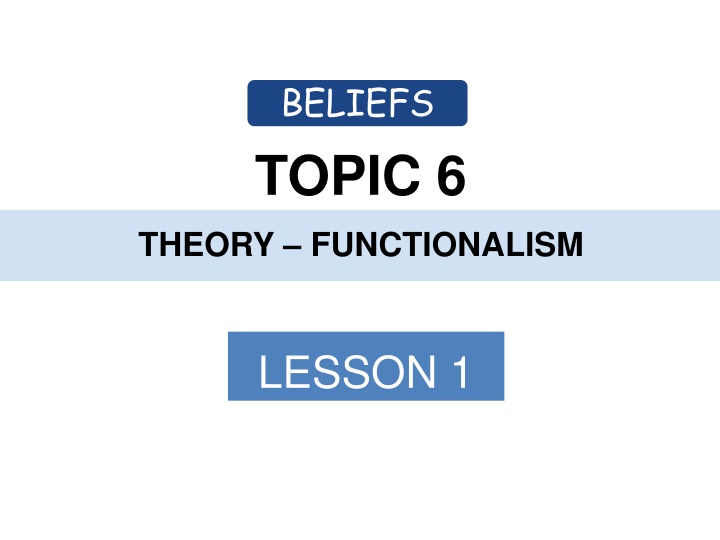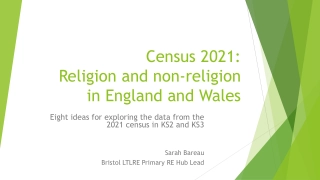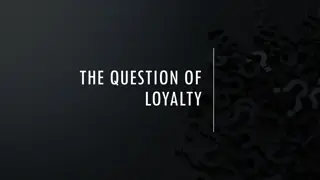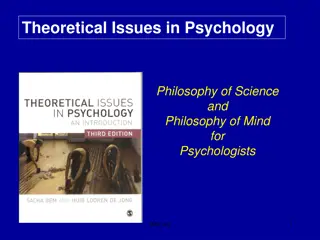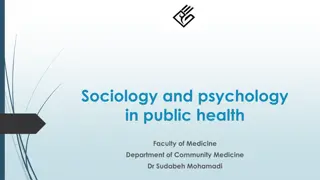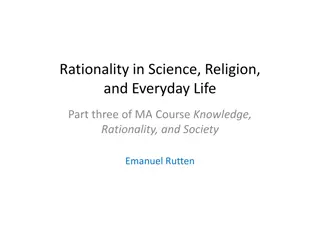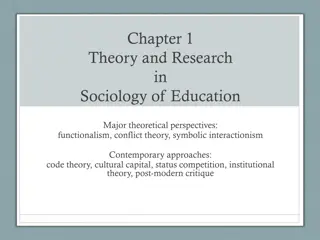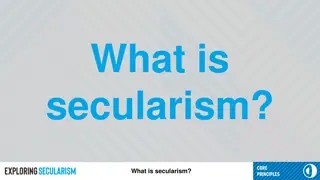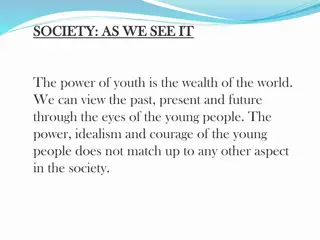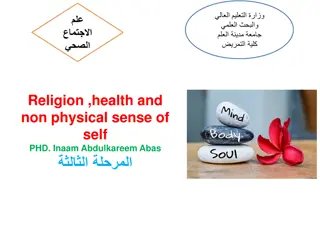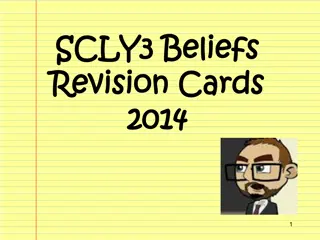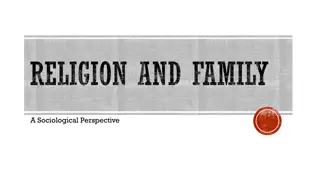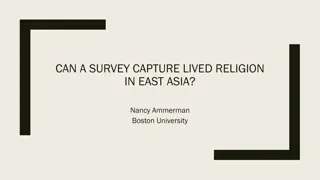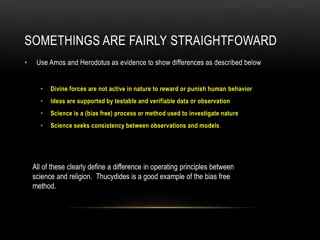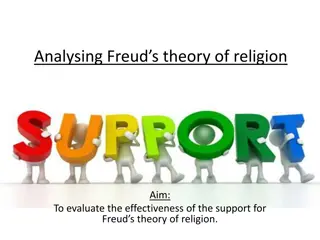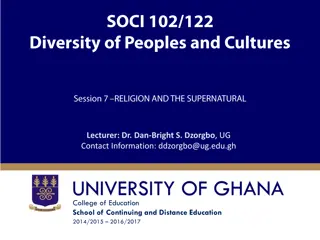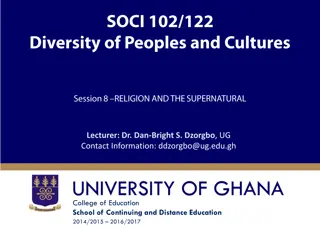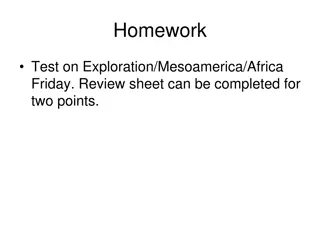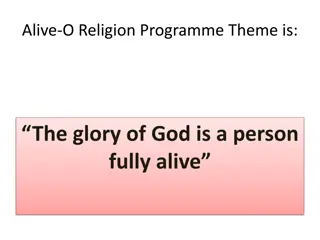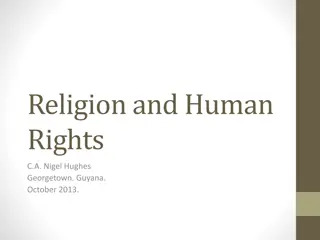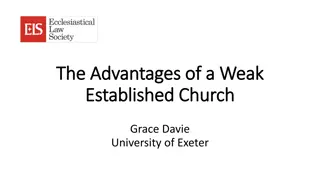Functionalism in Religion
Delve into the positive aspects of religion through the lens of functionalism, examining its role in maintaining order and solidarity within society. Explore how Emile Durkheim's concepts of the sacred and the profane shed light on the symbolic significance of religious practices. Evaluate the usefulness of functionalist perspectives on religion and uncover the societal benefits attributed to religious beliefs and rituals.
Download Presentation

Please find below an Image/Link to download the presentation.
The content on the website is provided AS IS for your information and personal use only. It may not be sold, licensed, or shared on other websites without obtaining consent from the author.If you encounter any issues during the download, it is possible that the publisher has removed the file from their server.
You are allowed to download the files provided on this website for personal or commercial use, subject to the condition that they are used lawfully. All files are the property of their respective owners.
The content on the website is provided AS IS for your information and personal use only. It may not be sold, licensed, or shared on other websites without obtaining consent from the author.
E N D
Presentation Transcript
BELIEFS TOPIC 6 THEORY FUNCTIONALISM LESSON 1
ALL: I can identify the positive features of religion and describe how functionalists view the role of religion. Do Now Task Study the images below and discuss how religion is being used in the situation. Stretch & Challenge Is religion such a positive influence on society?
Big Question: What happened in England after the Battle of Hastings? of religion? LESSON OBJECTIVE: To understand how functionalist view the role of religion is society. CWK: How do functionalists explain the role LESSON OUTCOMES: SOME: I can evaluate the usefulness of the functionalist view on religion. MOST: I can explain using sociological evidence the functionalist view on the role of religion. ALL: I can identify the positive features of religion and describe how functionalists view the role of religion. Key terms and definitions: Functionalism A sociological theory seeing society as a system of interrelated parts working together. Totemism an emblem of a clan such as an animal or plant symbolising the groups identity. Civil religion a belief system that attaches sacred qualities to society itself.
ALL: I can identify the positive features of religion and describe how functionalists view the role of religion. Task 1 As a group brainstorm the positive functions religion can give to a society. Functionalists believe that religion plays a vital part in establishing value consensus. That is maintaining order and solidarity.
SOME: I can evaluate the usefulness of the functionalist view on religion. MOST: I can explain using sociological evidence the functionalist view on the role of religion. Task 2 Emile Durkheim For Durkheim the key feature of religion was the distinction between the sacred and the profane. The sacred are things set apart and are forbidden which inspire a sense of awe, wonder and fear. The profane are things with no special significance they are ordinary and mundane. Things that are sacred evoke powerful feelings which are worshipped they are basically worshipping society itself. He studied the simplest form of society- Clan Society Arunta Australian Aboriginal tribe . Clans consisted of bands of kin who come together to perform rituals which worship the totem. The rituals reinforce the groups solidarity and sense of belonging . The totem inspires feelings of awe as it represents the power of the group. The sacred symbols represent society's collective consciousness . The shared norms, values, beliefs and knowledge that makes social life and cooperation between individuals possible. Regular shared religious ritual's binds individuals together. By making us feel part of something greater than ourselves, religion reinvigorates and strengthens us to face life's challenges. Finally, Durkheim also sees religion helping us on an individual level through the cognitive functions of religion. It helps us add reasoning and meaning to ultimate questions. 1. Explain the difference between the sacred and the profane. 2. What does Totemism mean? 3. What does a collective conscious mean? 4. Draw a sketch of a totem that best represents the UK. 5. How might this view be evaluated?
SOME: I can evaluate the usefulness of the functionalist view on religion. MOST: I can explain using sociological evidence the functionalist view on the role of religion. Task 3 Bronislaw Malinowski He agrees with Durkheim that religion promotes solidarity, but does so by performing psychological functions for individuals. Religion promotes social solidarity by helping individuals cope with emotional stress. There is two situations where it performs this. The first was where the outcome is important but is uncontrollable and thus uncertain. He studied the Trobriand Islander of the Western Pacific contrasting fishing in the lagoon and in the ocean. In the lagoon, fishing was safe and used poisoning and no ritual was needed. However, in the ocean which is more dangerous and uncertain, they performed canoe magic rituals to ensure a safe and successful expedition. Secondarily, religion helps in times of life crisis, events such as birth, marriage and especially death, bring potentially dangerous and disruptive changes amongst groups of people. So religion helps offer an explanation to these crisis and bring solidarity and comfort to people in order to stop them potentially questioning society. 1. Explain why death might be a the main reason for religion belief? 2. Can you think of any other periods of uncertainty or times when we feel vulnerable . that religion/religious rituals may help us with? 3. Sort out the evaluation points made about Malinowski s study.
Provided an in-depth study using valid, ethnographic research over several years. The Trobriand islanders used rituals to cultivate crops- the produce was used to make payments Malinowski has been criticised for exaggerating the importance of religious rituals. Influenced several other anthropologists and sociologists in relations to ritual and belief. It has been argued that rituals are related more to the general maintenance of society than social solidarity and or dealing with uncertainty and danger. Offered a different perspective to the role of religion and ritual by focusing on the psychology behind it. Strengths Weaknesses
Provided an in-depth study using valid, ethnographic research over several years. The Trobriand islanders used rituals to cultivate crops- the produce was used to make payments Malinowski has been criticised for exaggerating the importance of religious rituals. Influenced several other anthropologists and sociologists in relations to ritual and belief. It has been argued that rituals are related more to the general maintenance of society than social solidarity and or dealing with uncertainty and danger. Offered a different perspective to the role of religion and ritual by focusing on the psychology behind it. Strengths Weaknesses
Provided an in-depth study using valid, ethnographic research over several years. The Trobriand islanders used rituals to cultivate crops- the produce was used to make payments Malinowski has been criticised for exaggerating the importance of religious rituals. Influenced several other anthropologists and sociologists in relations to ritual and belief. Offered a different perspective to the role of religion and ritual by focusing on the psychology behind it. It has been argued that rituals are related more to the general maintenance of society than social solidarity and or dealing with uncertainty and danger. The Trobriand islanders used rituals to cultivate crops- the produce was used to make payments Provided an in-depth study using valid, ethnographic research over several years. Malinowski has been criticised for exaggerating the importance of religious rituals. Influenced several other anthropologists and sociologists in relations to ritual and belief. It has been argued that rituals are related more to the general maintenance of society than social solidarity and or dealing with uncertainty and danger. Offered a different perspective to the role of religion and ritual by focusing on the psychology behind it.
SOME: I can evaluate the usefulness of the functionalist view on religion. MOST: I can explain using sociological evidence the functionalist view on the role of religion. Task 4 Talcott Parsons Talcott Parsons, like Malinowski, sees religion helping individuals to cope with unforeseen events and uncontrollable outcomes. He identifies to other essential functions, these being creating and legitimising society s central values and it is the primary source of meaning . Religion help people to adjust to adverse events or circumstances and therefore maintains stability. 1. How are the 10 Commandments integrated into society? 2. How did religious leaders respond to the Black Death in the 14th Century? 3. What do you think Parsons means by the following statement?; Religious rituals and prayer act as a tonic to self confidence . 4. How can you evaluate this idea?
SOME: I can evaluate the usefulness of the functionalist view on religion. MOST: I can explain using sociological evidence the functionalist view on the role of religion. Task 5 Robert Bellah Bellah, like Parsons, is interested in how religion unifies society, especially a multi-faith society like America. America promotes social solidarity through religious imagery and phrases. Civil Religion is a faith in the American way of life . 1. Watch the following video clip www.youtube.com/watch?v=rWFz7p3yA88 and note down 5 point how America unites its citizens. 2. Explain how the following events unite Americans Thanksgiving, 4th July and Veterans Day. 3. Does Britain have a civil religion? 4. How can Bellah s view be evaluated?
SOME: I can evaluate the usefulness of the functionalist view on religion. Task 6 As a class discuss the possible problems with the functionalist views on the role of religion. Below, are some images to help you. Stretch & Challenge Is there any evidence that what the functionalists say about the role of religion is still going on in society today?
Task 7 Using the information provided on the functionalist view on religion, design a summary of notes, include the following . What general functionalists view the role of religion maintaining; What Durkheim states about the role of religion; What Malinowski says about the role of religion; What Parsons says about the role of religion; What Bellah says about the role of religion; Any overall evaluation of the theory.
Overall role Durkheim Parsons Functionalist view on the role of religion Malinowski Bellah Evaluation
Plenary Using the knowledge you have learnt this lesson, explain how religion fits in to Durkheim's organic analogy .
